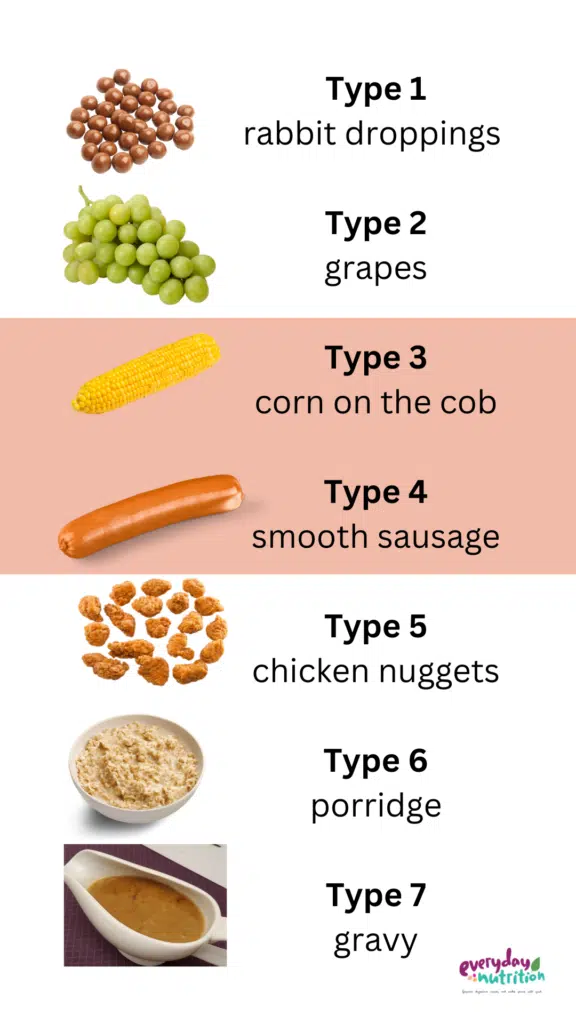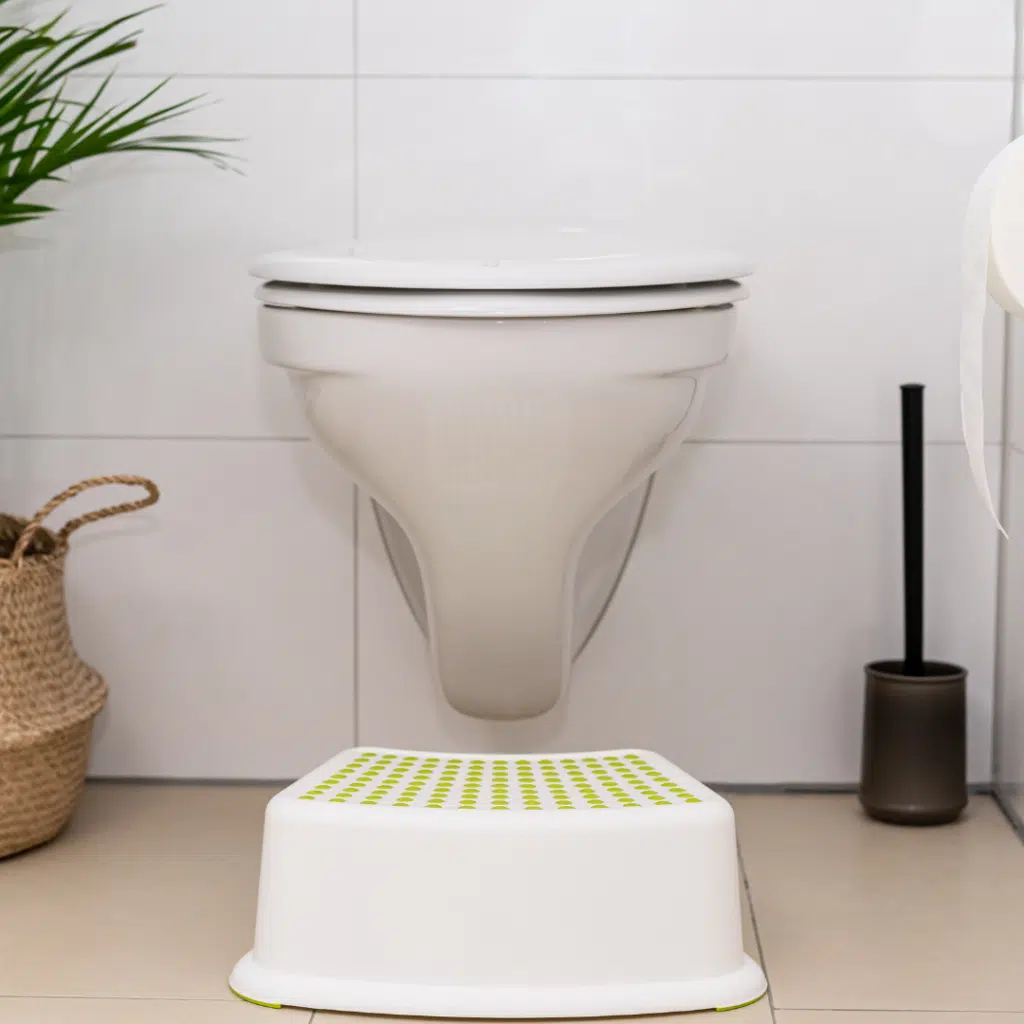What goes in, has to come out. While not the most common dinner time conversation, Poop is essential for your well-being. As gut health dietitians, we get asked about this topic A LOT, so let’s dive in and discuss what’s normal, what’s not, and how to address any concerns.
Your poop is the residue of the food and fluids you consume after your body and gut microbiome have absorbed the necessary nutrients. What you eat plays a significant role in your digestive system, and your poop can provide valuable insights into the functioning of your digestive tract and your recent diet.
What’s normal and what’s not:
When it comes to digestion and poop, it’s normal to experience some day-to-day fluctuations. In fact, this variability is a sign of a diverse and balanced diet. If you’ve recently changed your diet, lifestyle, or started taking medication, it’s likely to affect your poop temporarily. If the change settles back to normal quickly, there’s usually no cause for concern. However, if symptoms persist, it might indicate an underlying issue that needs attention.
Common Poop Problems:
Diarrhoea Frequent loose or watery stools, occurring more than usual, can be caused by various factors such as viruses, food poisoning, medications, bacteria, food intolerances, and gut-brain axis issues like IBS.
Constipation This is the opposite of diarrhea and involves small, hard, infrequent, or difficult-to-pass stools. Causes may include low fibre intake, dehydration, lack of physical activity, certain medications, and gut-brain axis issues like
Colour Usually, poop is brown, but it can change based on your diet. For example, eating spinach may give your poop a green hue. Certain food colourings can also alter poop colour. While this is normal, certain colours like light, red, or black may indicate other issues that require attention.

Food in the stool Finding undigested food in your stool, especially with fibrous foods like corn or seeds, is quite normal and not usually a cause for concern.
Floating stool If your stool is floating and appears fatty, it could be a sign of bile acid malabsorption, pancreatitis, an infection, or excessive gas.
Foul smelling poop. While poop naturally has a distinctive smell, significant changes in smell may be related to malabsorption, infections, bowel conditions like IBD, pancreatitis, or genetic conditions like cystic fibrosis.
How long should a normal poop take?
A normal poop shouldn’t take more than 5 minutes or so. It should come out easily and leave you feeling satisfied. It’s not normal to experience a lot of pressure, burning or need to strain too much. Small, hard and difficult to pass poops may be a sign of lack of fibre and water in your diet.
Common causes of abnormal Poop
- Stress: High stress levels can put your body on constant alert mode, affecting the nerves in your gut and increasing intestinal sensitivity. This can be a significant factor in irritable bowel syndrome (IBS). Strategies like yoga, gut hypnotherapy, CBT, and other psychological approaches can greatly improve IBS type symptoms.
- Lack of fibre: Fibre is an essential part of food that doesn’t get absorbed by the body. It passes through the digestive tract, nourishing the gut microbiome and giving your poop its form. There are different types of fibre, such as soluble, insoluble, fermentable, viscous, complex, and isolated. Understanding how fibres behave in the gut can help you choose the right ones to improve your poop.
- Food Sensitivity: Food sensitivities may not be dangerous, but they can cause changes in your poop. Identifying the specific molecules in different foods that bother your body and moderating them just enough to maintain variety and a great relationship with food can help you stay comfortable. Keep in mind, everyone’s sensitivities are different, so a specialist dietitian who knows what patterns to look for and how to interpret them can save a lot of blood sweat and tears.
- Gut Irritants: Alcohol, caffeine, fizzy drinks, chocolate, fatty, and spicy foods can irritate the gut and alter gut motility. While most people don’t need to avoid these completely, some may need to be cautious about the quantity and frequency of consumption.
- Hormones: Hormones can impact gut transit. For instance, progesterone, which is highest between ovulation and menstruation (and super high in pregnancy), can slow gut transit. Prostaglandins released during your period can speed up gut transit and cause “period poops”. Read more about hormones and how they impact the gut here.
- Medications & Supplements: All medications and supplements, even natural ones, have side effects, and gut symptoms are common. If you’re experiencing side effects, consider if the medication or supplement is necessary, if there are ways to manage the side effects. If your side effects are moderate to severe or you will need the medication long term, your doctor or dietitian can help you manage these or may be able to suggest alternative options.
- Pooping Behaviours: How and when you poop can make a difference. Honour the urge and avoid holding on for too long, as it can lead to constipation. Allow time and don’t rush when using the bathroom. For constipation, a cup of coffee in the morning or using a footstool to raise your feet can help with bowel movements.
- Underlying Illness: Various health conditions can affect poop frequency, form, and colour. Some may be minor inconveniences, while others could be more serious. If you experience sudden changes in your bowel habits, it’s a good idea to consult your doctor.
When to see your doctor:
- Unexplained weight loss.
- Unexplained rectal bleeding.
- Ongoing changes in your regular bowel routine.
- IBS type symptoms when you have a family history of bowel conditions.
- IBS symptoms starting after the age of 50.
- Unexplained nutrient deficiencies e.g. low iron.
Remember your poop is a valuable indicator of your digestive health. If you have any concerns or need help improving your bowel movements, don’t hesitate to reach out to a doctor or dietitian. We can assist you in finding the right solutions to live a healthier and more comfortable life.
How to Improve your Pooping Experience:
- Include more fibre from fruits, vegetables, nuts, seeds, whole grains, and legumes in your diet. If you’re following a low FODMAP diet, consult with our dietitians for suitable options and the right type of fibre for your symptoms.
- Stay hydrated by drinking enough water.
- Find a movement you enjoy and do it regularly.
- Be mindful of caffeine intake and how it impacts your gut.

- Be mindful of gut irritants and high FODMAP foods.
- Ensure you get enough sleep.
- Improve your position by using a foot stool to raise your feet off the floor in the bathroom
Final Thoughts
There is a wide range of normal when it comes to poop. It’s okay to have variations in frequency, colour, and form from time to time. Our bodies are unique, and what’s normal for one person may not be the same for another. If you’re experiencing difficulties or concerns with your bowel movements, don’t hesitate to reach out to one of our specialist dietitians. We’re here to help you understand your body better and get back in the driver’s seat to live your best life! Book Now.








2 Comments
Hi Joanne.
Interesting blog.
I would like to know which is the best fibre to use for people with IBS as there are so many on the market.